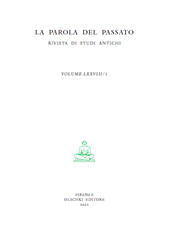2023 - Leo S. Olschki
Articolo
Versione Digitale
Download | Copia/incolla | NO Stampa
Aristarco e il peana : l'esegesi anticaa Hom., Il. I 472-474
P. 133-163
- The identity of the god Paieon, physician of the gods, who appears twice in the V book of the Iliad (vv. 401-402; 899-901) was highly debated in antiquity. The current opinion was that the god had to be considered the same as Apollo, usually invoked as Paean; instead, according to Aristarchus, Homer described an earlier situation, where Apollo and Paieon still were different divinities. The question played a role in a difficult case, the athetesis of Il. I 474. Lemma, critical sign and indirect tradition attest the athetesis for v. 474, whereas the internal arguments – one of which is the distinction between the two gods – work better if applied to v. 473, where the paean-song is mentioned: if Apollo and Paieon were not yet identified, the presence of the song, which is homonymous to the physician of the gods, would sound odd in an Apolline context – the scene is Chrysa in the Troad, after the well-known events of the first book of the Iliad.
- This is confirmed by the presence, in the v. 473, of the action of singing, whereas the surrounding verses allude only to dance – i.e. the meaning which Aristarchus gave to Homeric μολπή and μέλπω. If the reconstruction is correct, the actual version of scholia and critical signs ad loc. may have been produced by a later grammarian, who did not understand Aristarchus' motivations and moved the arguments which supported the athetesis from 473 to 474. Possibly, the repetition observed by Aristarchus on 474 respect to 472 – unable in itself to athetise the verse – attracted the attention of the later reworker. [Publisher's text]
-
Informazioni
Codice DOI: 10.1400/293806
ISSN: 2610-8739
-
Nello stesso fascicolo
- La tomba 168 (della coppa di Nestore) di Pithekoussai, o sia della conoscenza incerta
- Elea - Velia : l'abitato della città bassa nella progettazione urbana tra il VI e V sec. a.C.
- Per una archeologia del vino fra gli Italici
- Staring at the Stars in Palaiologan Constantinople : the Case of the Methodus Inveniendi Horoscopi by Demetrios Chloros
- Un umanista italiano a Bisanzio : Francesco Filelfo al servizio di Giovanni VIII Paleologo
- Aristarco e il peana : l'esegesi anticaa Hom., Il. I 472-474
- Latino-Coptica neglecta : intorno a due rari latinismi segnalati da Amedeo Peyron (1841) nella passio copta dell'apa Colluthus
- Graffiti vascolari inediti di epoca arcaica da Zankle
- Another Look at the Inscription on Poggio Civitate Artifact PC19710684
- Another Look at the Inscription on Poggio Civitate Artifact PC19710684
- Ester Salgarella, Aegean Linear Script(s) : Rethinking the Relationship between Linear A and Linear B.
- Marisa Tortorelli Ghidini, Orfeo e il cigno


